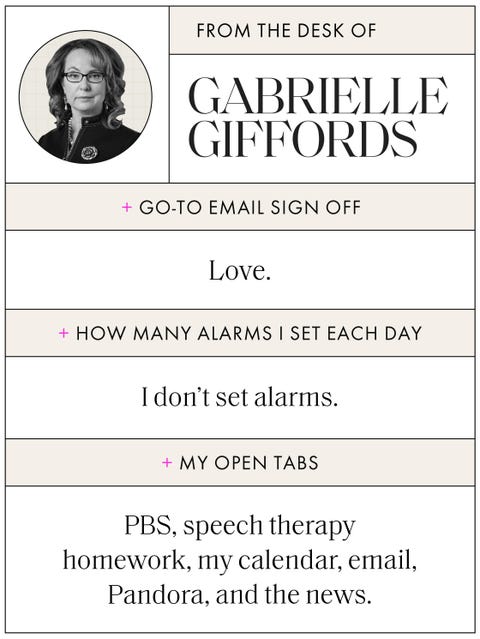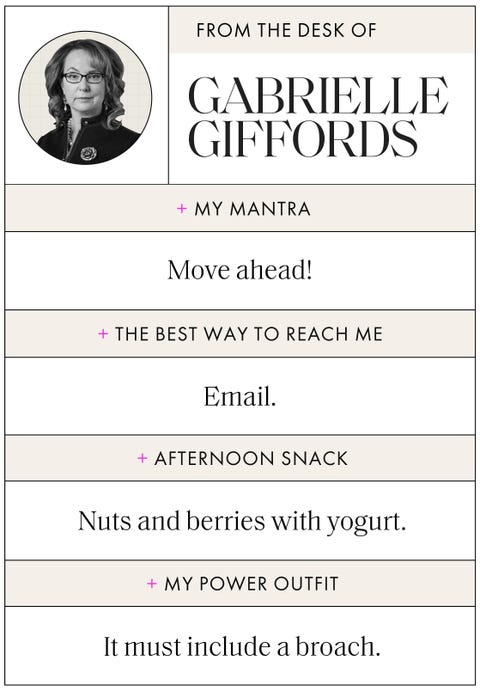In ELLE.com's monthly series Office Hours, we ask people in powerful positions to take us through their first jobs, worst jobs, and everything in between.
It’s been nearly 10 years
to the day since then-Congresswoman Gabrielle Giffords survived an assassination attempt outside a supermarket in Arizona, instantaneously changing her life and career. At the time, Giffords had just begun serving her third term as the representative of Arizona’s 8th congressional district, only the third woman in the state’s history to serve in the U.S. House and a noted rising star; she then resigned in 2012 to focus on her recovery. Since leaving Washington D.C., Giffords co-founded a gun safety advocacy organization that bears her name, and the team recently worked closely with President-elect Joe Biden on his own gun safety agenda, according to Vanity Fair. Below, Giffords reflects on how her aphasia, a lasting result of the shooting that makes it more difficult to speak, has affected her approach to her career and what still gives her hope about the gun safety movement.
My first job
I always volunteered to shovel out the stables so I could get horse riding lessons as a kid. But my first real job was at El Campo Tires, the business my family ran in Tucson, during my high school summers. As an adult, I came back to run El Campo, which was not easy. The most important lesson I learned was to surround yourself with a good team and trust them to do their job. A “good team” doesn’t mean people who always agree with you. Surrounding yourself with yes men—or women—isn’t a strategy for success; it’s a strategy for getting people to tell you how great you are. I’ve always tried to surround myself with passionate, talented people who are team players and unafraid to say why they think you are wrong. Even if we sometimes disagree, we know we’re ultimately working toward the same goal.

Worst career advice I've received
I briefly worked at a very prestigious office job in New York City. Someone there told me I should stop wearing my cowboy boots, so I did because I wanted to fit in. Now I know you should wear whatever boots make you feel powerful and like yourself; that’s when you do the best work. And that’s my best advice that I’ve gotten and given: Be yourself. I’m cheerful and emotive—even now, when talking is hard. Some people didn’t expect that from a young woman running a tire store or serving in Congress. But that’s how I am, and that’s how I’m staying.
How my physical challenges affect how I approach my job
Ten years ago, my life changed drastically. One day I was in Congress, getting ready to meet my constituents. The next day I was in a hospital fighting for my life. After I was shot, I had to relearn a lot of the things that once came easily. Today, I don’t take anything for granted. Because speaking is harder for me than it once was, I’m more committed than ever to using my voice when it really matters. I have so much admiration for leaders and changemakers who faced daily struggles, whether physical challenges or systemic racism and sexism—like Rep. John Lewis and Justice Ruth Bader Ginsburg—and persevered. I hope that my determination might inspire others, like theirs inspired me.
The hard truth about working in politics
I’ve joked before that the best training I had for my political career was mucking horse stalls growing up in Arizona. It’s not hard to point out what’s wrong with politics—there’s plenty to choose from these days. But what I tried to do as a congresswoman, and what I still try to do at my organization, Giffords, is to reach across the aisle and find common ground. It’s not easy. This is the hardest part of politics and probably the most important part too. I have high hopes that President-elect Biden and Vice President-elect Harris will prioritize this bridge-building when they take office.

How I talk to people about guns
I’ve been a gun owner for a long time. I understand—as do responsible gun owners across the country—that rights and responsibility go hand in hand. I also know that the Second Amendment doesn’t justify the public health epidemic of gun violence. The Second Amendment doesn’t mean that nearly 100 Americans a day need to lose their lives. I don’t want any American to have to go through what my mom went through on the day I was shot or what Pam Bosley went through on the day her son was shot. Gun deaths are preventable, and gun safety laws can help us avoid many of these tragedies without taking away anyone’s rights.
What keeps me hopeful
I’ve been fortunate to meet so many young people who I know are going to change the world, and many of them already have. To have such conviction and clarity of purpose at such a young age is really remarkable. I’ve lost count of the many leaders I’ve met who were galvanized into action by the tragedy at Marjory Stoneman Douglas or by the daily violence they experienced on their way to and from school in our country’s most underserved neighborhoods. I’ve tried to take hardship and turn it into purpose over these past 10 years, and I’m so inspired by those who have learned this lesson at such a young age.
This interview, conducted over email, has been lightly edited and condensed for clarity.
